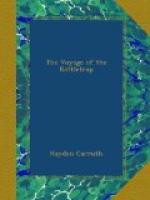“She’ll do,” said Jack. “In case of wreck, we’ll escape on her, if possible. She’ll also be very handy in making landings where the harbor is poor, and in exploring unknown coasts.”
[Illustration: Grandpa Oldberry Presages Disaster]
All of this work took several days, but when it was done the Rattletrap was ready for the voyage, and we decided to start the next morning.
“She’s as prairie-worthy a craft as ever scoured the plain,” was Jack’s opinion; “and if we can keep the four wheels from starting in opposite directions we’ll be all right.”
But where was Ollie all this while? And who was Ollie, anyhow? Ollie was Jack’s little nephew, and he lived back East somewhere—I don’t remember where. The nearer we got ready to start, the more firmly Jack became convinced that Ollie would like to go along, so at last he sent for him to come, and he arrived the night before our start. Ollie liked the idea of the trip so much that he simply stood and looked at the wagon, the guns, the pony, and the horses, and was speechless. At last he managed to say:
“Uncle Jack, it’ll be just like a picnic, won’t it?”
The next morning we started as early as we could. But it was not before people were up.
“Where be they going?” asked Grandpa Oldberry.
“Oh, Nebraska, and Wyoming, and the Black Hills, and any crazy place they hear of,” answered Squire Poinsett.
“They’ll all be scalped by Injuns,” said Grandpa Oldberry. “Ain’t the Injuns bad this fall?”
“So I was a-reading,” returned the Squire. “And in the hills I should be afeared of b’ar.”
“Right,” assented Grandpa. “B’ar and sim’lar varmints. And more ’specially hossthieves and sich-like cutthroats. I disremember seeing three scalawags starting off on such a fool trip since afore the war.”
II: OUTWARD BOUND
The port of Prairie Flower was in the eastern part of the Territory of Dakota. It stood out on an open plain a half-dozen miles wide, which seemed to be the prairie itself, though it was really the valley of the Big Sioux River, that funny stream which could run either way, and usually stood still in the night and rested. To the east and west the edges of this valley were faintly marked by a range of very low bluffs, so low that they were mere wrinkles in the surface of the earth, and made the valley but very little lower than the great plain which rolled away for miles to the east and for leagues to the west.
It was a beautiful morning a little after the middle of September that the Rattletrap got away and left Prairie Flower behind. The sun had been up only half an hour or so, and the shadow of our craft stretched away across the dry gray plain like a long black streak without end. The air was fresh and dewy. The morning breeze was just beginning to stir, and down by the river the acres of wild sunflowers were




